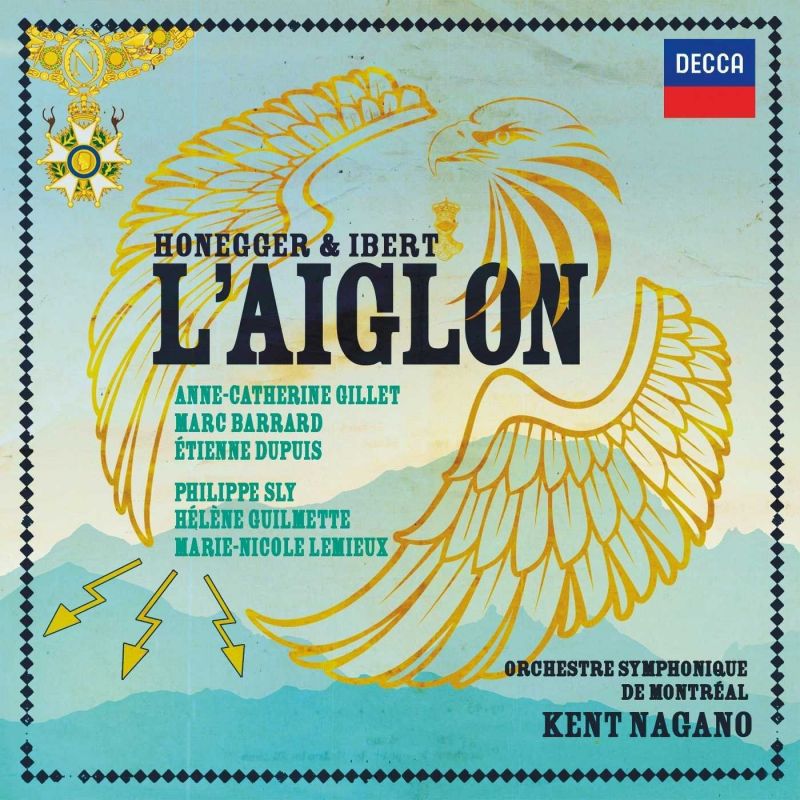HONEGGER/ IBERT L’Aiglon
View record and artist detailsRecord and Artist Details
Composer or Director: Honegger & Ibert
Genre:
Opera
Label: Decca
Magazine Review Date: 04/2016
Media Format: CD or Download
Media Runtime: 92
Mastering:
DDD
Catalogue Number: 478 9502DHO2

Tracks:
| Composition | Artist Credit |
|---|---|
| L’Aiglon |
Honegger & Ibert, Composer
Anne-Catherine Gillet, L’Aiglon, Soprano Étienne Dupuis, Metternich, Baritone Hélène Guilmette, Therese, Soprano Honegger & Ibert, Composer Isaiah Bell, Gentz, Tenor Jean-Michel Richer, Sedlinsky, Tenor Julie Boulianne, Fanny Elssler, Mezzo soprano Kent Nagano, Conductor Kimy McLaren, Comtesse Camerata, Soprano Marc Barrard, Flambeau, Baritone Marie-Nicole Lemieux, Marie-Louise, Contralto (Female alto) Montreal Symphony Orchestra Montreal Symphony Orchestra Chorus Pascal Charbonneau, Military Attaché, Tenor Philippe Sly, Marmont, Baritone Tyler Duncan, Prokesch, Baritone |
Author: Tim Ashley
Rostand’s play was written in 1900 as a travesti vehicle for Sarah Bernhardt, following her success in Hamlet the previous year, and self-consciously echoes Shakespeare in its examination of the relationship between volition and action. The Duke – drawn to Napoleonic idealism but trapped by Metternich’s sinister Realpolitik – dreams hopelessly of the France he will neither see again nor rule, though his forceful imagination gradually colours the lives of all those round him. In the climactic scene, he narrates the history of the battle of Wagram with such intensity that the old soldier Flambeau, fatally injured in a futile attempt to help the Duke escape, believes he is dying a hero’s death on the battlefield.
At the time of the opera’s premiere, the two composers kept teasingly quiet about who had written what. We now know, however, that Ibert composed Acts 1 and 5 and the Act 3 ballet, while Honegger undertook the rest. The pervasive mood is one of bittersweet nostalgia. Vocal writing and characterisation are remarkably consistent, but we can detect subtle differences elsewhere. Ibert’s contribution is characteristically refined and svelte. Honegger’s dissonances have greater bite, and his brass-writing is more elaborate and prominent. The booklet-notes make much of the opera as an expression of French nationalism in the face of the rise of Nazism, and it was indeed dropped from the repertoire during the Occupation, when Ibert’s music was proscribed. But the work is neither simplistic nor propagandist. Austrian culture was comparably under threat in 1937 and Ibert’s glorious waltzes evoke 19th-century Vienna even as they mourn its passing.
Of late there has been something of a revival of interest in the piece, with important stagings in Marseilles and Lausanne in 2004 and 2013 respectively. Decca’s recording was made in Montreal, during the series of concert performances that marked its Canadian premiere in March last year. Conducted with care and palpable affection by Kent Nagano, it boasts a fine, mostly francophone ensemble cast, with not a weak link anywhere. At its centre, in a trouser role that is a gift for a lyric soprano, is Anne-Catherine Gillet’s Duke, bright in tone and wonderfully subtle in her response to the complexities of both text and character. Marc Barrard is the touchingly funny Flambeau, while Etienne Dupuis makes Metternich all the more sinister by singing his music so beautifully. The orchestral sound is gorgeous, as is the recording itself, and only the occasional distant cough reminds us that it was made live.
Discover the world's largest classical music catalogue with Presto Music.

Gramophone Digital Club
- Digital Edition
- Digital Archive
- Reviews Database
- Full website access
From £8.75 / month
Subscribe
Gramophone Full Club
- Print Edition
- Digital Edition
- Digital Archive
- Reviews Database
- Full website access
From £11.00 / month
Subscribe
If you are a library, university or other organisation that would be interested in an institutional subscription to Gramophone please click here for further information.




